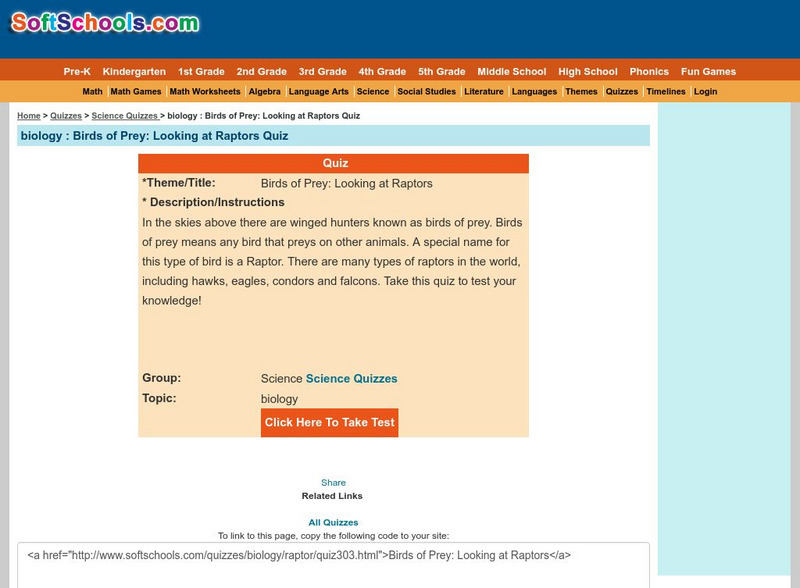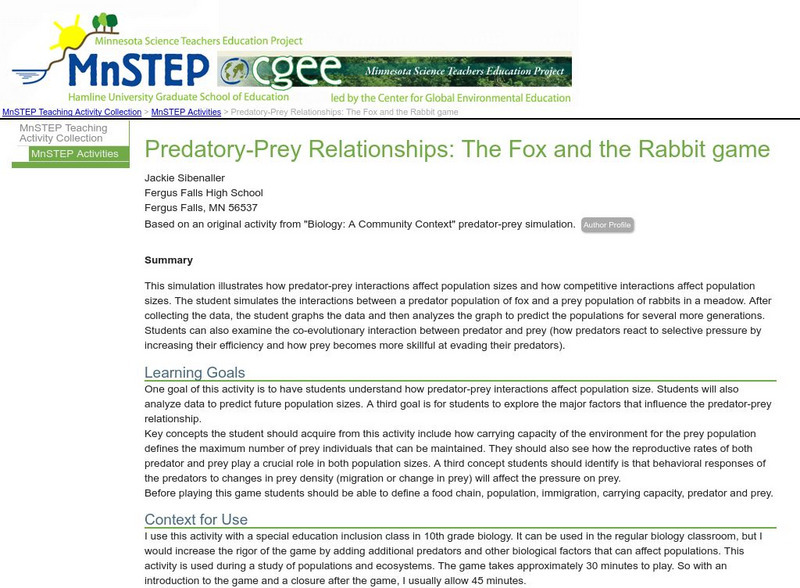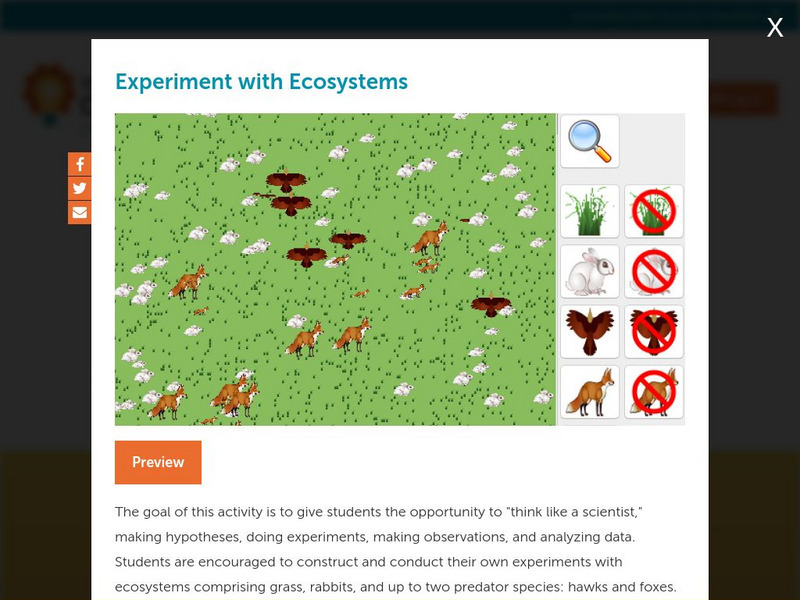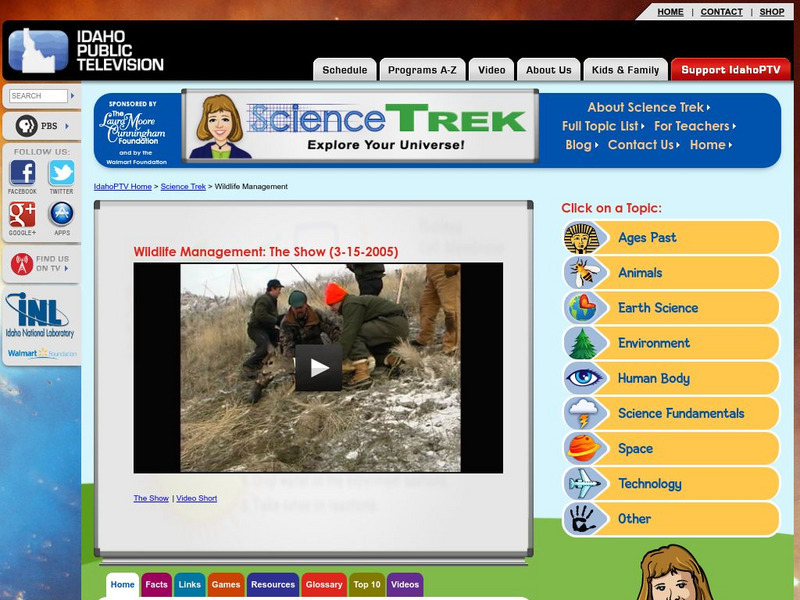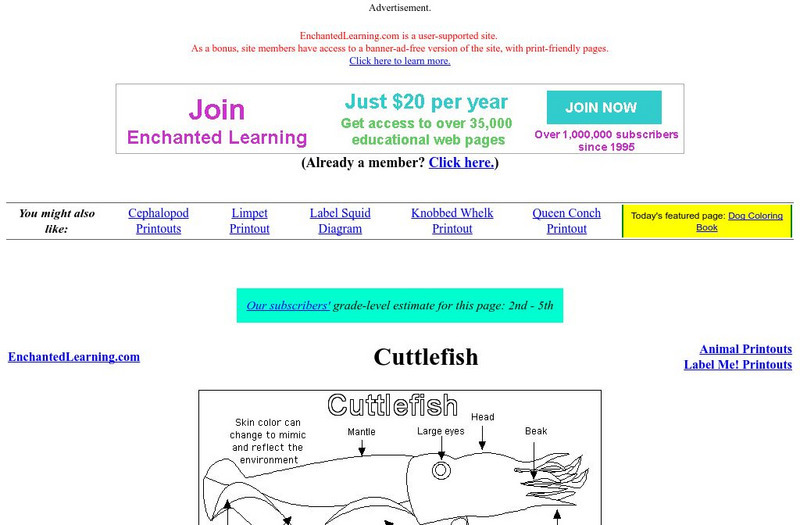PBS
Pbs Teachers:denali: The Wolf and the Moose: Predator and Prey Relationships
Examine the predator/prey relationship between wolves and moose in Alaska's Denali National Park and discuss how the balance of nature works between these two animals.
CK-12 Foundation
Ck 12: Episd: Predation
[Free Registration/Login may be required to access all resource tools.] Discover the predator prey relationship and the ways organisms adapt to predation. Understand the impact predation has on population size and evolution.
TeachEngineering
Teach Engineering: Biodomes
Students explore the biosphere's environments and ecosystems, learning along the way about the plants, animals, resources and natural cycles of our planet. Over the course of lessons 2-6, students use their growing understanding of...
Science Education Resource Center at Carleton College
Serc: Mn Step: The Flow of Energy: Balancing Ecosystems
A lesson outlining activities for a science unit where students can learn about the relationships and the flow of energy within an ecosystem. These include predator and prey, hosts and parasites, and consumers, producers, and decomposers.
PBS
Idaho Ptv: Predators
A comprehensive resource on the topic of predators. Includes half-hour video, facts, links, a reading list, resources for teachers, and a glossary, While there are links to videos, they may no longer work.
Other
Buzzle.com: Animal Sake: 10 Examples of Predator Prey Relationships
Explains what a predator-prey relationship is and describes ten examples of this.
CK-12 Foundation
Ck 12: Biology: Predation
[Free Registration/Login may be required to access all resource tools.] Discusses how predation affects population size and evolution.
Soft Schools
Soft Schools: Birds of Prey: Looking at Raptors Quiz
Take this interactive, multiple-choice quiz over birds of prey, then review your score and any missed questions at the end.
Other
Biology at Shaw High School: What Do Living Things Need to Survive?
Discusses the interrelatedness of all living things and of ecosystems and biomes, and what organisms need to survive and to maximize the carrying capacity of an ecosystem. This explanation is followed by a series of activities including...
Science Education Resource Center at Carleton College
Serc: Predatory Prey Relationships: The Fox and the Rabbit Game
This activity helps students understand how predator-prey interactions affect population sizes and how competitive interactions affect population sizes. They will also explore the major factors that influence the predator-prey relationship.
PBS
Pbs Teachers: Predator Protector Game Lesson
Describe the habitat, food web and ecosystem of shark species. Identify threats to sharks and explore how top predators help to maintain the balance of nature within ecosystems. This lesson plan also contains an interactive game.
Illustrative Mathematics
Illustrative Mathematics: 8.f Foxes and Rabbits
In this problem about the predator-prey relationship between the fox and rabbit populations, 8th graders are asked to identify and explain any functions that they see. Aligns with 8.F.A.1.
San Diego Zoo Global
San Diego Zoo: Alligators & Crocodiles
This resource provides detailed facts about alligators and crocodils, including how to distinguish between a crocodile and an alligator, information on their eating habits, how a mama crocodile protects her young, and more. There are...
Concord Consortium
Concord Consortium: Stem Resources: Experiment With Ecosystems
Learn what happens to different populations of organisms as their ecosystem changes. Design your own experiment and make your own guesses with what the result will be with this virtual ecosystem. Also experiment with producer/consumer...
National Geographic
National Geographic: Marine Food Webs
For this lesson, students learn about marine food webs and pyramids, and how energy flows through a marine ecosystem. They then research a marine organism and its role in a marine food web. The class pools their information to create a...
Sea World Parks & Entertainment
Sea World: Raptors
Outlines the characteristics of birds of prey, including classification, habitat, behaviors, and conservation. Helps students identify with these birds by integrating a list of "Books for Young Readers." Information at a level of upper...
Other
Kidwings: Virtual Owl Pellet Dissection
A complete lesson on owl pellets. Students can read information, watch a tutorial, and use their computer mouse to complete a dissection simulation right there on the screen.
National Geographic
National Geographic: Coral Reef Food Web
Explore the food web in a coral reef with these illustration. Identify the consumers, producers, and decomposers that are located within this ecosystem. Site includes illustration exploring the different food chains as well as questions...
Annenberg Foundation
Annenberg Learner: The Habitable Planet: Ecology Lab
Create the parameters of your own ecosystem by choosing which producers and consumers live there. Visualize how the food web operates and species populations change. This simulator mimics the food web within a typical ecosystem and gives...
PBS
Pbs Teachers:night Creatures of the Kalahari: Life in a Bottle
Understand that an ecosystem such as the Kalahari has a system of checks and balances to ensure that no species overpopulates and threatens the survival of other species. Chart a food chain and explore the balance between predator and prey.
PBS
Idaho Ptv: Dialogue for Kids: Wildlife Management
A collection of facts and links for learning about wildlife management. The facts cover what wildlife management is, the job of a wildlife manager, biodiversity, predators and prey, land capacity, habitat, and endangered animals. Other...
PBS
Pbs Learning Media: Catch Me if You Can
Students are asked to explain the predator/prey relationship and how it helps to maintain the balance of the ecosystems.
Enchanted Learning
Enchanted Learning: Cuttlefish
Explore the world of the cuttlefish, a unique cephalopod. Students will gain a greater understanding of this mollusk through fun facts, information on the anatomy, diet, predators and more at this site.
Smithsonian Institution
Smithsonian National Zoo: Chambered Nautilus
As part of the Invertebrates exhibit at the National Zoo, this site highlights various facts and interesting information on Chambered Nautilus. Topics covered in the overview include Physical description, Life span, Predators,...
Other popular searches
- Prey and Predators
- Arctic Predators and Preys
- Mollusks Prey and Predators
- Predators and Prey Reptiles
- African Predators and Prey
- Predators and Prey Africa
- Predators and Prey Oceans
- Marine Preys and Predators







